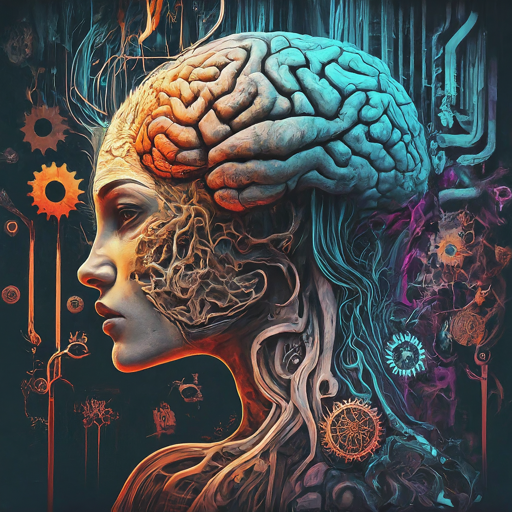How AI Shapes Our Brains and How We Use Them
 |
Thinking with Machines: How AI Shapes Our Brains and How We Use Them
Artificial intelligence (AI) is no longer science fiction. It’s woven into the fabric of our daily lives, from personalized recommendations to smart assistants. But what’s happening under the hood? How is AI affecting the way we think and process information? And how are we, in turn, adapting to this ever-evolving landscape?
The AI Impact: A Double-Edged Sword
The impact of AI on the brain is multifaceted. Some argue it strengthens specific cognitive functions:
- Enhanced Memory: AI tools can store and retrieve vast amounts of information, freeing up our brains to focus on understanding and analysis.
- Improved Efficiency: AI algorithms automate repetitive tasks, allowing us to shift our attention to higher-level thinking and problem-solving.
- Boosted Creativity: AI can generate unexpected ideas and connections, sparking new avenues for creative exploration.
However, concerns exist about the potential downsides:
- Attention Deficit: Constant exposure to AI-driven stimuli like notifications and instant gratification can shorten attention spans and hinder deep focus.
- Over-reliance: Relying heavily on AI for tasks like navigation or decision-making might weaken our own cognitive abilities in those areas.
- Ethical Dilemmas: As AI becomes more sophisticated, questions arise about bias, transparency, and the potential for manipulation.
Adapting to the AI Age
So, how are we navigating this complex interplay between AI and our brains? Here are some key trends:
- Lifelong Learning: Recognizing the potential for cognitive decline, individuals are increasingly seeking opportunities for continuous learning and brain training.
- Mindful Technology Use: A growing awareness of the potential downsides of AI is leading to calls for more mindful and intentional technology use.
- Human-AI Collaboration: Instead of viewing AI as a replacement, we’re starting to see it as a powerful tool to augment our human capabilities.
The Future: A Collaborative Dance
The future of AI’s impact on the brain is uncertain. However, it’s clear that humans and AI are locked in a dynamic dance of mutual influence. By understanding the potential benefits and risks, we can navigate this new landscape responsibly and maximize the positive impact of AI on our cognitive abilities and overall well-being.
AI offers a vast array of opportunities across diverse fields. Here are some specific examples beyond what I mentioned earlier:
Creative Industries:
- Music composition and generation: AI can create unique melodies, harmonies, and lyrics, inspiring human musicians and potentially leading to new musical genres.
- Personalized storytelling and entertainment: AI can tailor narratives, games, and recommendations to individual preferences, enhancing user engagement and immersion.
- Visual arts and design: AI can generate creative concepts, iterate on designs, and even create original artwork, pushing the boundaries of artistic expression.
Social Good and Development:
- Combating poverty and inequality: AI can analyze data to identify vulnerable populations, predict food shortages, and optimize resource allocation for targeted interventions.
- Disaster relief and emergency response: AI can analyze real-time data from sensors and satellites to predict and respond to natural disasters more efficiently.
- Education for underserved communities: AI-powered tutors and educational tools can provide access to quality education in remote or resource-limited areas.
Scientific Research and Exploration:
- Drug discovery and development: AI can analyze vast datasets and simulate molecular interactions to accelerate the discovery of new drugs and treatments.
- Space exploration and planetary science: AI can analyze data from space probes and telescopes to understand the universe better and identify potentially habitable planets.
- Climate change mitigation and adaptation: AI can model complex climate systems, predict future scenarios, and develop strategies to mitigate climate change and adapt to its impacts.
Agriculture:
- Precision agriculture: AI can analyze data from sensors and satellites to optimize crop yields and resource usage.
- Pest and disease detection: AI can identify pests and diseases early, allowing for targeted interventions and reducing crop losses.
- Livestock management: AI can monitor animal health and behavior, improving animal welfare and production efficiency.
Law & Justice:
- Predictive policing: AI can analyze crime data to predict areas with high crime rates, enabling more efficient resource allocation.
- Sentencing and parole: AI can analyze data to recommend more just and effective sentencing and parole decisions.
- Fraud detection: AI can identify fraudulent activity in financial transactions, protecting individuals and businesses.
Future Tech & Innovation:
- Self-driving cars: AI can revolutionize transportation with autonomous vehicles, making roads safer and more efficient.
- Smart cities: AI can optimize traffic flow, resource management, and public services in urban areas.
- Personalized healthcare: AI can analyze patient data to provide preventative care and targeted treatment plans.
- Space exploration: AI can assist in robot-controlled missions and data analysis from distant planets.
These are just a few examples, and the potential applications of AI continue to expand rapidly. It’s important to remember that AI is a tool, and its impact will ultimately depend on how we choose to use it. By leveraging its potential responsibly, AI can contribute to a more prosperous, sustainable, and equitable future for all.
Do you have any specific fields in mind where you’d like to explore AI’s potential further?
Key Takeaways:
- AI can enhance specific cognitive functions, but also presents potential downsides.
- Adapting to AI requires lifelong learning, mindful technology use, and human-AI collaboration.
- The future holds exciting possibilities for the co-evolution of AI and the human brain.
Transform your career path: Discover the power of AI with our free course and certificate.
What are your thoughts? How do you see AI impacting your own brain and how are you adapting? Share your insights in the comments below!

.jpg)
Comments
Post a Comment
Thank you!